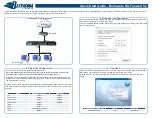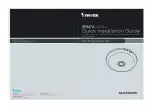
212
probe count
Use
probe count
to specify the probe times.
Use
undo probe count
to restore the default.
Syntax
probe count
times
undo probe count
Default
In an UDP tracert operation, the NQA client performs three probes to each hop along the path.
In other types of operations, the NQA client performs one probe to the destination per operation.
Views
DHCP/DLSw/DNS/FTP/HTTP/SNMP/TCP operation view
ICMP/UDP echo operation view
UDP jitter operation view
UDP tracert operation view
Predefined user roles
network-admin
Parameters
times
: Specifies the probe times.
•
For the UDP tracert operation, this argument specifies the times of probes to each hop along
the path. The value range for this argument is 1 to 10.
•
For other types of operations, this argument specifies the times of probes to the destination per
operation. The value range for this argument is 1 to 15.
Usage guidelines
The following describes how NQA performs different types of operations:
•
A TCP or DLSw operation sets up a connection.
•
A UDP jitter or voice operation sends a number of probe packets. The number of probe packets
is set by using the
probe packet-number
command.
•
An FTP operation uploads or downloads a file.
•
An HTTP operation gets a Web page.
•
A DHCP operation gets an IP address through DHCP.
•
A DNS operation translates a domain name to an IP address.
•
An ICMP echo operation sends an ICMP echo request.
•
A UDP echo operation sends a UDP packet.
•
An SNMP operation sends one SNMPv1 packet, one SNMPv2c packet, and one SNMPv3
packet.
•
A path jitter operation is accomplished in the following steps:
a.
The operation uses tracert to obtain the path from the NQA client to the destination. At
maximum of 64 hops can be detected.
b.
The NQA client sends ICMP echo requests to each hop along the path. The number of
ICMP echo requests is set by using the
probe packet-number
command.
















































